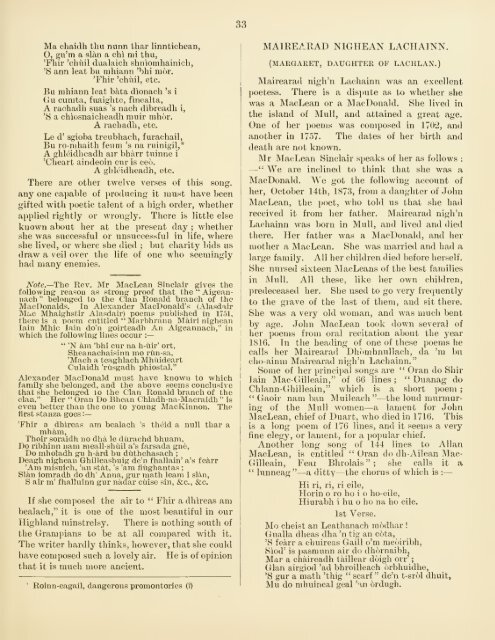You can download this book in pdf format - Electric Scotland
You can download this book in pdf format - Electric Scotland
You can download this book in pdf format - Electric Scotland
Create successful ePaper yourself
Turn your PDF publications into a flip-book with our unique Google optimized e-Paper software.
Ma chaidh thu nunn thar l<strong>in</strong>ntichean,<br />
0, gu'm a slàn a chi mi thu,<br />
'Fliir 'ehiiil dualaich shniomha<strong>in</strong>ich,<br />
'S ann leat bu nihiann 'bhi mòr.<br />
'Fhir 'chùil, etc.<br />
Bu mhiann leat bàta dìonach 's i<br />
Gu cunita, fuaighte, f<strong>in</strong>ealta,<br />
A rachadh suas 's nach dibrcadh i,<br />
'S a chiosnaicheadh muir mhòr.<br />
A rachadh, etc.<br />
Le d' sgioba treubhach, furacliail,<br />
Bu ro-mhaith feuni 's na ru<strong>in</strong>igil,*<br />
A ghleidheadh air bharr tu<strong>in</strong>ne i<br />
'Cheart a<strong>in</strong>deo<strong>in</strong> cur is ceo.<br />
A ghleidheadh, etc.<br />
There are other twelve verses of <strong>this</strong> song,<br />
any one capable of produc<strong>in</strong>g it must have been<br />
gifted witli poetic talent of a high order, whether<br />
applied riglitly or wrongly. There is little else<br />
known about her at the present day ; wiiether<br />
siie was successful or unsuccessful <strong>in</strong> life, where<br />
siie lived, or where she died ; but charity bids us<br />
draw a veil over the life of one who seem<strong>in</strong>gly<br />
had many enemies.<br />
A'^o^e.—The Rev. Mr MacLean S<strong>in</strong>clair gives the<br />
follow<strong>in</strong>g reason as strong proof that the"Aigeannach<br />
" belonged to the Clan Ronald branch of the<br />
MacDonalds. In Alexander MacDonald's (Alasdair<br />
Mac Mhaighstir Alasdair) poems published <strong>in</strong> 1751,<br />
there is a poem entitled "Ma rbhrann Màiri nighean<br />
Ia<strong>in</strong> Mhic Ia<strong>in</strong> do'n goirteadh An Aigeannach," <strong>in</strong><br />
which the follow<strong>in</strong>g l<strong>in</strong>es occur :—<br />
" 'N am 'bhi cur na h-ùir' ort,<br />
Sheanachais<strong>in</strong>n mo rùn-sa,<br />
'Mach a teaghlach Mhùideart<br />
Culaidh 'rùsgadh phiostal."<br />
Alexander MacDonald must have known to which<br />
family she belonged, and the above seems conclusive<br />
that she belonged to the Clan Ronald branch of the<br />
clan." Her " Oran Do Bhean Chladh-na-Macraidh " is<br />
even better than the one to young MacK<strong>in</strong>non. The<br />
first stanza goes :—<br />
'Fhir a dhireas am bealach 's theid a null thar a<br />
mhàm,<br />
Thoir soraidh no dhà le dùrachd bhuam.<br />
Do ribh<strong>in</strong>ii nam meall-shiiil a's farsada gnè.<br />
Do mholadh gu h-àrd bu dùthchasach ;<br />
Deagh nighean Ghilleasbuig de'n fhalla<strong>in</strong>' a's feàrr<br />
'Am misnich. 'an stàt, 's 'am fìùghantas ;<br />
Slàn iomradh do dh' Anna, gur math learn i slàn,<br />
S air m' fhallu<strong>in</strong>n gur nàdar cùise s<strong>in</strong>, &c., &c.<br />
If she composed the air to " Fhir a dhireas am<br />
bealach," it is one of the most beautiful <strong>in</strong> our<br />
Highland m<strong>in</strong>strelsy. There is noth<strong>in</strong>g south of<br />
the Grampians to be at all compared with it.<br />
The writer hardly th<strong>in</strong>ks, however, that she could<br />
have composed such a lovely air. He is of op<strong>in</strong>ion<br />
that it is much more ancient.<br />
" Ro<strong>in</strong>n-eagail, dangerous promontories (?)<br />
33<br />
MAIREARAD NIGHEAN LACHAINN.<br />
(MARGARET, DAUGHTER OF LACHLAN.)<br />
Mairearad nigh'n Lacha<strong>in</strong>n was an excellent<br />
poetess. There is a dispute as to whether she<br />
was a MacLean or a MacDonald. She lived <strong>in</strong><br />
the island of Mull, and atta<strong>in</strong>ed a great age.<br />
One of her poems was composed <strong>in</strong> 1702, and<br />
another <strong>in</strong> 1757. The dates of her birth and<br />
death are not known.<br />
Mr MacLean S<strong>in</strong>clair speaks of her as follows :<br />
— " We are <strong>in</strong>cl<strong>in</strong>ed to th<strong>in</strong>k that she was a<br />
MacDonald. We got the follow<strong>in</strong>g account of<br />
her, October 14th, 1S73, from a daughter of Joi<strong>in</strong><br />
MacLean, the poet, who told us tliat she had<br />
received it from her father. Mairearad nigh'n<br />
Laciia<strong>in</strong>n was born <strong>in</strong> Mull, and lived and died<br />
there. Her father was a MacDonald, and Iter<br />
motlier a MacLean. She was married and had a<br />
large family. All her children died before herself.<br />
She nursed sixteen MacLeans of the best families<br />
<strong>in</strong> Mull. All tiiese, like her own children,<br />
predeceased her. She used to go very frequently<br />
to the grave of the last of them, and sit there.<br />
She was a very old woiiian, and was much bent<br />
by age. John MacLean took down several of<br />
her poems from oral recitation about the year<br />
1816. In the head<strong>in</strong>g of one of these poems he<br />
calls her Mairearad Dhòmhnullach, da 'm bu<br />
cho-a<strong>in</strong>m Mairearad nigh'n Lacha<strong>in</strong>n."<br />
Some of her pr<strong>in</strong>cipal sono's are " Oran do Shir<br />
Ia<strong>in</strong> Mac-Gillea<strong>in</strong>," of 66 l<strong>in</strong>es " ; Duanag do<br />
Chlann-Ghillea<strong>in</strong>," which is a short poem ;<br />
" Gaoir nam ban Muileach"—the loud murmur<strong>in</strong>g<br />
of the Mull women—a lament for John<br />
MacLean, chief of Duart, who died <strong>in</strong> 1716. This<br />
is a long poem of 176 l<strong>in</strong>es, and it seems a very<br />
f<strong>in</strong>e elegy, or lament, for a popular chief.<br />
Another long song of 144 l<strong>in</strong>es to Allan<br />
MacLean, is entitled " Oran do dh-Ailean Mac-<br />
Gillea<strong>in</strong>, Fear Bhrolais"; she calls it a<br />
" lunneag"—a ditty—the chorus of which is :<br />
Hi ri, ri, ri eile,<br />
Hor<strong>in</strong> o ro ho i o ho-eile,<br />
Hiurabh i hu o ho na ho eile.<br />
1st Verse.<br />
Mo cheist an Leathanach mòdhar !<br />
Gualla dheas dha 'n tig an còta,<br />
'S feàrr a chuireas Gaill o'm meùiribh,<br />
Sìod' is pasmunn air do dhòrnaibh.<br />
Mar a chàireadh tàillear dòigh orr'<br />
Glan airgiod 'ad bhroilleach òrbhuidhe,<br />
'S gur a math 'thig " scarf" de'n t-sròl dhuit,<br />
Mu do nihu<strong>in</strong>eal geal 'an òrdugh.<br />
;<br />
—

















